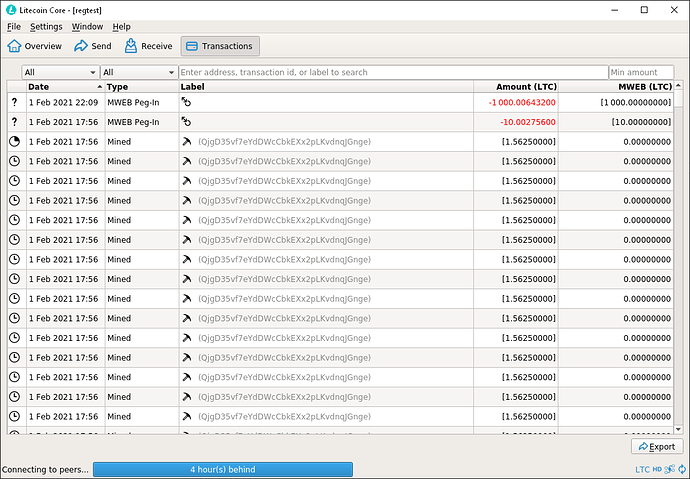January Progress:
We were able to get Grin++ ready in time for the hardfork, which went smoothly. That was the final planned fork, so Grin++ is back in maintenance mode, and should no longer be a distraction for the remainder of this project ![]()
The bad news ![]() - I was not able to get the automated windows build ready, so I did not kick off the community-wide testnet this month like I hoped.
- I was not able to get the automated windows build ready, so I did not kick off the community-wide testnet this month like I hoped.
The good news ![]() - The delay was mostly a consequence of a new proposal by Tevador (lead developer of RandomX) called MingleJingle[1]. MingleJingle is another design for providing non-interactive txs in Mimblewimble, and by far the most detailed one yet. Tevador was able to use his extensive experience with Monero stealth addresses to make a number of improvements on our design (LIP-0004). The benefits of his design for sub-addresses[2] and output encoding[3] were immediately obvious, so I decided to switch gears for a bit and use what I learned from MingleJingle to improve MWEB addressing and output structure[4].
- The delay was mostly a consequence of a new proposal by Tevador (lead developer of RandomX) called MingleJingle[1]. MingleJingle is another design for providing non-interactive txs in Mimblewimble, and by far the most detailed one yet. Tevador was able to use his extensive experience with Monero stealth addresses to make a number of improvements on our design (LIP-0004). The benefits of his design for sub-addresses[2] and output encoding[3] were immediately obvious, so I decided to switch gears for a bit and use what I learned from MingleJingle to improve MWEB addressing and output structure[4].
The big advantage of this new addressing scheme is that we no longer have to “grind” through different possible stealth addresses when restoring from a wallet seed. With my far-inferior design, the wallet would have to scan the MWEB utxo set and attempt to restore using the private keys once for each stealth address. So if you generated 10 different stealth addresses in the past, it would scan the UTXO set 10 times, which could take several hours after a decade of MWEB usage. While stealth addresses allow reuse without leaking information about your transactions, if you wanted to maintain several identities with a wallet (lame example: multiple pseudonyms on a site like litecointalk.io that each advertise a donation address), then each identity would still need to generate its own stealth address, resulting in these long scan times. But with Monero’s subaddresses (and Tevador’s improved version), we only have to scan each UTXO once, regardless of how many stealth addresses you’ve generated in the past ![]()
Some more good news ![]() - After finishing the new addressing improvements, I took another pass at the UI and transaction history display and found a number of ways to make it easier to follow where funds are moving. One change I made was to add a new column for MWEB amounts in the transaction history, so peg-ins & peg-outs look a little more intuitive:
- After finishing the new addressing improvements, I took another pass at the UI and transaction history display and found a number of ways to make it easier to follow where funds are moving. One change I made was to add a new column for MWEB amounts in the transaction history, so peg-ins & peg-outs look a little more intuitive:
The code is now ready for the new testnet, which we can launch as soon as we’ve get a working windows build. If anyone has experience setting up automated builds of bitcoin or litecoin for distribution on windows (preferably using Github Actions, but any CI would be fine), I could really use your help! Come chat with me at Telegram: Contact @MWEB_Testnet
The great news ![]() - There are still a ton of ways we can (and will) continue to improve the MWEB code, in particular around syncing, but most of what remains is not required for initial launch. So I think I’m finally ready to commit to a code-complete* timeline…
- There are still a ton of ways we can (and will) continue to improve the MWEB code, in particular around syncing, but most of what remains is not required for initial launch. So I think I’m finally ready to commit to a code-complete* timeline…
![]()
![]()
![]() I will be submitting the code for review on March 15th.
I will be submitting the code for review on March 15th. ![]()
![]()
![]()
This will contain all of the consensus, P2P, and wallet code necessary for supporting MWEB. The only thing it will be missing is the activation code, which I will add after the reviews and audits are all finished.
* Code-complete means ready for developer reviews & formal audits. It will not be ready for activation until after all reviews & audits are finished.
[1] minglejingle.md · GitHub
[2] Subaddress - Monero Documentation
[3] minglejingle.md · GitHub
[4] New output encoding by DavidBurkett · Pull Request #44 · ltc-mweb/libmw · GitHub
Happy Groundhog Day everyone! Although COVID killed the in-person celebrations here in Punxsutawney, you can still watch this crucial event unfold live from the comfort of your home: https://www.groundhog.org/
